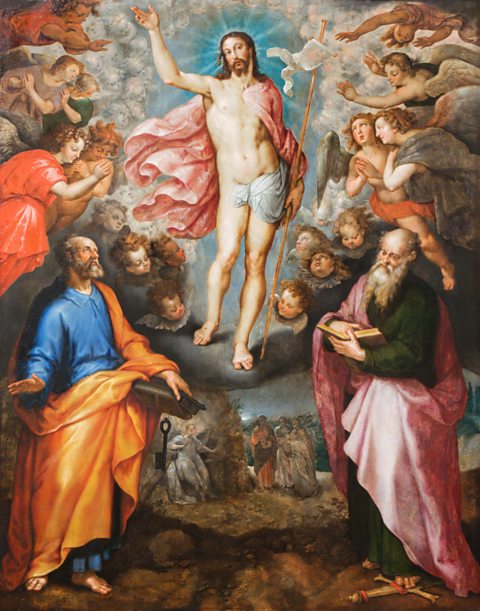Belief in life after death among non-religious people
Not all people who believe in life after death would call themselves religious.
For example, some people believe in the concept of reincarnationThe religious belief that existence is a cycle of birth, life, death and rebirth, and that the soul survives physical death and is reborn in a new body. who are not necessarily Buddhist, Hindu or Sikh. Others feel natural justice requires good to be rewarded and evil to be punished, but they do not hold one of the traditional faiths that promise an afterlife.
For some people, near-death experiences (NDEs), a sense of dУЉjУ vu or feeling they have witnessed ghosts (perhaps through a medium) convince them there is life beyond death.
What does Christianity say about life after death?
Christian beliefs about life after death are based on the resurrectionThe Christian belief that Jesus rose from the dead on the third day after the crucifixion. The rising from the dead of believers on the Last Day in a new, or risen, life. of Jesus Christ.

Christians believe that Jesusт death and resurrection are part of Godтs divine plan for humankind. Through his death on the cross, Jesus pays the penalty for mankindтs sin. Mankindтs relationship with God is therefore restored. This is called atonement.
Christians believe that three days after the crucifixionRoman method of execution by nailing someone to a cross, often until they die of asphyxiation; used on Jesus and many others., God raised Jesus from the dead and he once again appeared to his disciples. This is taken to mean that Jesusт sacrifice was a victory over sin and death. Although physical death still happens, those who believe in Christ and live good lives will be given eternal life in Heaven.
Many Christians believe that after death they will be taken into the presence of God, and they will be judged for the deeds they have done or failed to do during their lifetime.
Some of the guiding principles for what will happen upon death include the following.
Judgment
Some Christians believe that this judgement will happen when they die. Others believe that there will be a Day of Judgement at the end of time, when everybody will be judged. Some believe that judgement will happen in two stages - an initial personal judgement when you die, followed by the definitive judgement at the end of time.
Hell
Since God has given human beings free will, there must be an opportunity for people to reject God. This is the basis of the idea of Hell.
Hell has traditionally been depicted as a place of eternal fire that symbolises pain and suffering. This is seen as the result of the refusal to accept the happiness that God wants people to share with Him.